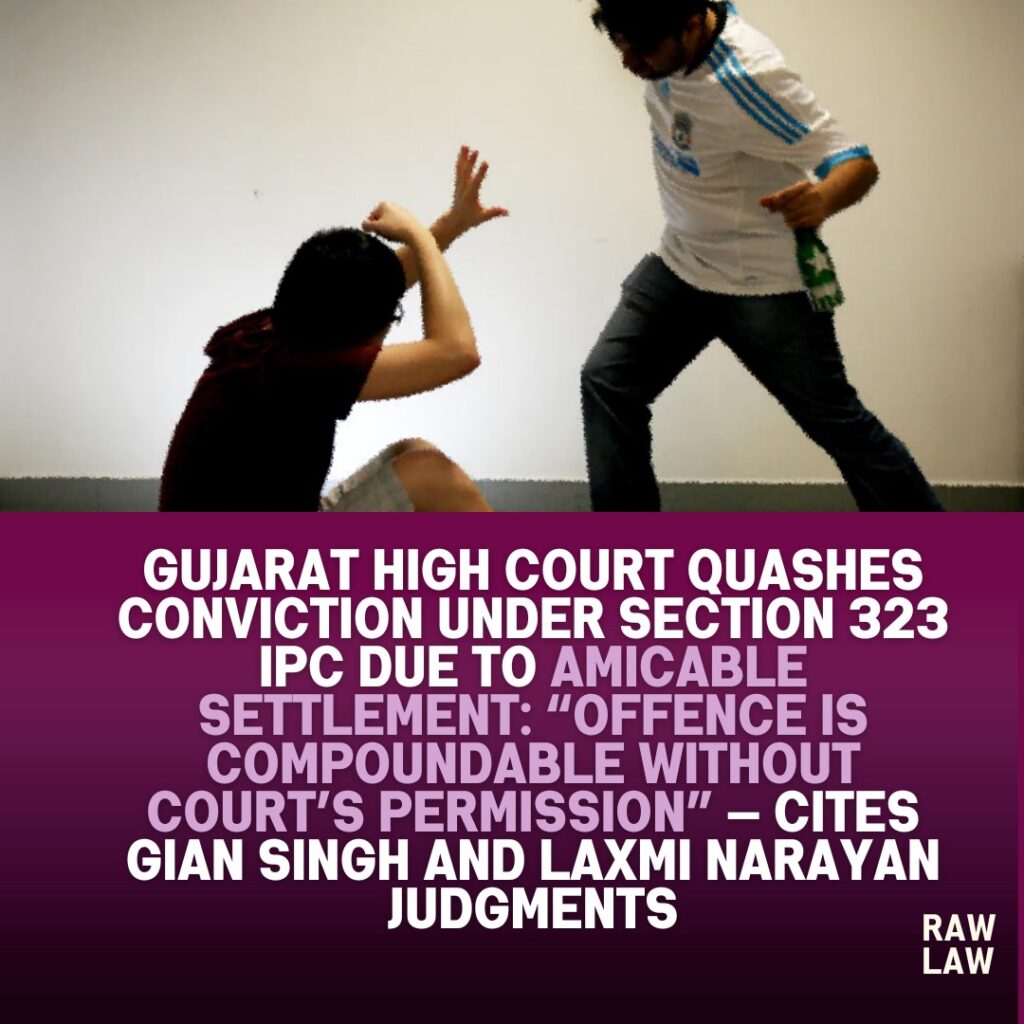Court’s Decision
The Gujarat High Court set aside the conviction and sentence under Section 323 read with Section 34 of the IPC in a criminal appeal where the parties had amicably settled the dispute. The Court observed that since the offence under Section 323 IPC is compoundable without the court’s permission under Section 320 Cr.P.C., and the settlement was voluntary, the continuation of proceedings would be a waste of judicial time. The conviction and sentence dated 3.4.2012 were thus quashed and the accused were acquitted.
Facts
The criminal appeals arose from a judgment delivered by the Special Judge (Atrocity) and Additional Sessions Judge, Surendranagar, in Special Case No.14 of 2011. The appellants had been convicted under Sections 323 and 34 IPC and sentenced to six months’ simple imprisonment along with a fine of ₹1,000 each, and 15 days’ simple imprisonment in default. They had been acquitted under Sections 504 IPC and 3(1)(x) of the SC/ST Act. During the pendency of the appeal, the original complainant submitted an affidavit of settlement stating that the dispute was minor, had been resolved amicably through village intervention, and that he did not wish to pursue the matter further.
Issues
- Whether the conviction under Section 323 IPC, a compoundable offence, could be quashed in light of the subsequent amicable settlement.
- Whether proceedings under the Atrocities Act and other IPC provisions could be quashed under the inherent jurisdiction of the High Court despite a prior conviction.
Petitioner’s Arguments
The appellants contended through their counsel that the matter had been resolved outside the court, and the complainant no longer had any grievance. They prayed for quashing of the conviction in light of the voluntary settlement, asserting that the dispute was minor and the complainant had no objections to setting aside the conviction.
Respondent’s Arguments
The State, through the learned APP, opposed the settlement, pointing out that two appeals had been filed by the State—one for enhancement of sentence and another challenging acquittal under the Atrocities Act. The State also inquired whether any compensation had been paid, to which the complainant responded that he had received ₹5,000 from the Social Welfare Department. The State opposed quashing of proceedings based merely on compromise.
Analysis of the Law
The Court analyzed Section 320 of the Cr.P.C. which permits compounding of certain offences and noted that Section 323 IPC is listed in Table 1 as a compoundable offence without requiring court permission. It emphasized that once the complainant voluntarily agrees to compound the offence and the offence falls within this category, further prosecution becomes unnecessary.
Precedent Analysis
- Gian Singh v. State of Punjab [(2012) 10 SCC 303]
Laid down guiding principles on quashing criminal proceedings based on compromise, especially when offences are private in nature and the possibility of conviction is remote. - State of Madhya Pradesh v. Laxmi Narayan [(2019) 5 SCC 688]
Reaffirmed the view that offences of a civil nature may be quashed post-settlement, but heinous offences and those involving public interest cannot be so quashed. - Prathvi Raj Chauhan v. Union of India [(2020) 4 SCC 727]
Held that courts may quash proceedings under Section 482 Cr.P.C. even in cases under the SC/ST Act if exceptional circumstances exist and to prevent abuse of law. - Nandini Sundar v. State of Chhattisgarh [(2011) 7 SCC 457] and Raghunathrao Ganpatrao v. Union of India [1993 (1) SCR 480]
These cases were cited in the context of fraternity and promoting peace among citizens, supporting the spirit of settlement in minor personal disputes.
Court’s Reasoning
The Court found that:
- The offence under Section 323 IPC is compoundable without permission.
- The settlement was voluntary and intended to maintain social harmony.
- The complainant, present personally before the court, expressed his desire not to pursue the case and affirmed that the accused had treated him respectfully post-dispute.
- Continuing proceedings would serve no purpose and waste judicial time.
Accordingly, the court held that the appeal deserved to be allowed.
Conclusion
The Gujarat High Court allowed Criminal Appeal No. 563 of 2012, set aside the conviction and sentence dated 3.4.2012 under Section 323 read with Section 34 IPC, and acquitted the accused. The State’s appeals for enhancement and against acquittal were dismissed.
Implications
This judgment underscores that where offences are compoundable and of a personal nature, courts can promote reconciliation and closure instead of enforcing continued prosecution. It reiterates that the ends of justice may be better served by upholding voluntary settlements in non-serious offences and helps reduce litigation load by preventing unnecessary continuation of proceedings in minor, private disputes.
Summary of Cases Referred and Their Relevance
- Gian Singh (2012) – Laid down broad parameters for quashing proceedings post-compromise.
- Laxmi Narayan (2019) – Clarified when quashing is permissible for non-compoundable offences.
- Prathvi Raj Chauhan (2020) – Upheld inherent powers of the court even in SC/ST Act cases to prevent misuse.
Raghunathrao Ganpatrao (1993) and Nandini Sundar (2011) – Emphasized constitutional values of fraternity and dignity to justify settlement in disputes of minor nature.



